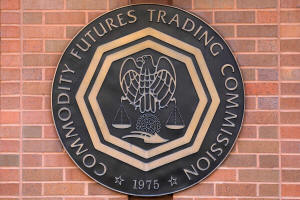Exclusive-U.S. Commodity Futures Trading Commission chair to resign
early next year
 Send a link to a friend
Send a link to a friend
 [December 10, 2020]
By Michelle Price [December 10, 2020]
By Michelle Price
WASHINGTON (Reuters) - Heath Tarbert will
resign as chair of the U.S. derivatives market regulator early next year
when Democratic President-elect Joe Biden designates an acting agency
head, ensuring a "smooth transition," he told Reuters in an exclusive
interview.
A former corporate attorney and senior Treasury Department official,
Tarbert was nominated by President Donald Trump to be both chair and one
of five commissioners at the Commodity Futures Trading Commission (CFTC),
taking office in July 2019.
Commissioners are political appointees, with a maximum of three from the
same party allowed at any time. The chair serves at the president's
discretion, but commissioners are independent.
Tarbert, a Republican, said he wants to return to the private sector.
While he will resign as chair, he expects to stay on as a commissioner
after Biden takes office on Jan. 20 while he finalizes his plans.

"It's important to have a smooth handover and a smooth transition," said
Tarbert. "It's obviously been a tremendous adventure and - I think -
successful time in government ... but I would like to return to the
private sector in some relevant leadership role," he said.
Tarbert, 44, did not speculate on his replacement. Washington analysts
say Democratic commissioners Rostin Behnam and Dan Berkovitz are the
front-runners, and would likely take a tougher stance on the industry.
During his tenure at the CFTC, which began policing the over-the-counter
derivatives or "swaps" market after it nearly toppled the financial
system in 2008, Tarbert has led an unusually active rule-making agenda,
said lawyers.
The agency has finalized 40 rules and proposed 21 more, according to
data provided by the agency, while juggling practical and regulatory
challenges created by the COVID-19 pandemic.
Several of the completed rules stemmed from the 2008 financial crisis,
including big, contentious changes such as limits on speculative
physical commodities positions and capital requirements for non-bank
swap dealers.
Some have been criticized by consumer advocates and Democrats for being
too weak, while lawyers say others were rushed, resulting in problematic
holes and snags.
[to top of second column]
|

Signage is seen outside of the U.S. Commodity Futures Trading
Commission (CFTC) in Washington, D.C., U.S., August 30, 2020.
REUTERS/Andrew Kelly/File Photo

"There's always a tension between getting stuff done, getting it
done in a timely fashion, and getting it absolutely perfect," said
Tarbert.
Generally speaking, however, Tarbert has avoided the partisan
scrapping and pro-industry accusations that have dogged other Trump
regulators, with 87% of his votes passing on a bipartisan basis,
according to agency data.
"He did everything he could to bring consensus to the agency, but
sometimes it's impossible," said Sheila Bair, the former chair of
the Federal Deposit Insurance Corporation who has worked closely
with Tarbert.
Tarbert's enforcement record has also surprised lawyers. In 2020,
the agency imposed $1.33 billion in penalties, the third
year-on-year increase, with a record 113 actions.
Notable cases include a landmark $920 million market manipulation
settlement with JPMorgan Chase & Co , and a $95.7 million settlement
with Houston-based Vitol Inc, the CFTC's first corruption-based
fraud case.
"I think that busts the myth that Republicans are soft on Wall
Street," said Tarbert. Institutions should be treated "like adults"
with reasonable regulation and supervision, he said. "There is no
flexibility when people wantonly break the rules."
(Reporting by Michelle Price; Editing by Tom Brown)
[© 2020 Thomson Reuters. All rights
reserved.] Copyright 2020 Reuters. All rights reserved. This material may not be published,
broadcast, rewritten or redistributed.
Thompson Reuters is solely responsible for this content.
 |